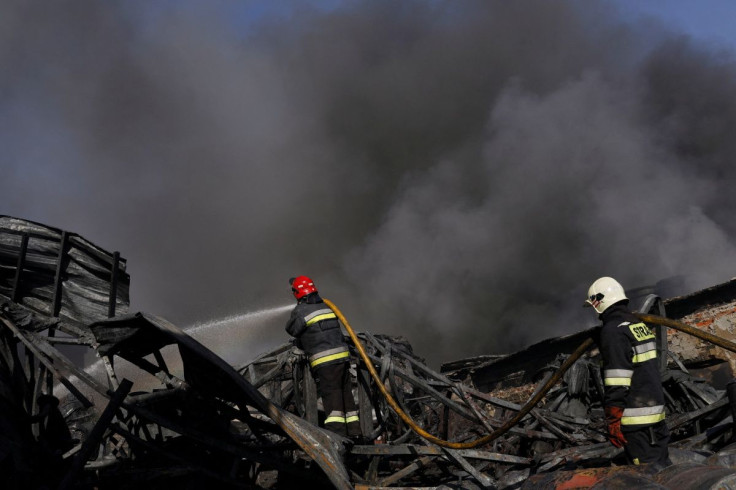Ukraine Apartment Block Toll Rises As Zelenskiy Laments Russian Firepower Advantage

Rescue workers on Monday pulled some survivors from an apartment block destroyed by a Russian missile strike that killed 30 people in eastern Ukraine, while Russian shelling killed at least three in the second-largest city of Kharkiv.
The civilian deaths hammered home the human cost of Russia's invasion of Ukraine, now in its fifth month, as Ukrainian President Volodymyr Zelenskiy lamented Russia's "big advantage" in artillery despite Western offers of help.
In the city of Chasiv Yar, rescuers made voice contact with two people in the wreckage of the five-storey apartment building demolished by a rocket on Saturday, and emergency services released video of workers pulling survivors from the concrete debris, where up to two dozen people had been trapped.
But the death toll also rose steadily, the State Emergency Service said. An official from the president's office put the number of dead at 30.
Rescuers could be seen lifting one person from the ruins to a stretcher, and carrying away two bodies in white bags. Nine people had been rescued so far.
One survivor, who gave her name as Venera, said she had wanted to save her two kittens.
"I was thrown into the bathroom, it was all chaos, I was in shock, all covered in blood," she said, crying. "By the time I left the bathroom, the room was full up of rubble, three floors fell down.
"I never found the kittens."
Further north in Kharkiv, Monday's strikes with artillery, multiple rocket launchers and tanks injured 31 people including two children, regional governor Oleh Synehubov said. At least one strike hit a residential building in the city, where a column of flats had collapsed into rubble.
"I saw lights, the headlights of rescuers and I started screaming 'I am alive, please get me out'," survivor Valentina Popovichuk told Reuters on a nearby Kharkiv street.
She was asleep when her building was hit three or four times in the early morning. "The rescuers entered the hallway, knocked down the door and took me out."
The attack on Chasiv Yar in Donetsk province was part of Russia's push to capture all of the industrial Donbas region in the east, partly controlled by separatist proxies since 2014, after declaring victory in Luhansk province earlier this month.
Military experts say Russia is using artillery barrages to pave the way for a renewed push for territory by ground forces. Russian President Vladimir Putin, who says he aims to hand control of Donbas to the separatists, on Monday eased rules for Ukrainians to acquire Russian citizenship.
"(Russia) indeed unfortunately has a big advantage in artillery," President Zelenskiy told reporters in Kyiv on Monday alongside Dutch Prime Minister Mark Rutte.
"With all the partners who are ready to give support, I talk about artillery. There is indeed not enough."
A spokesman for Ukraine's International Legion, a fighting unit of foreign troops, said Ukraine's heavy artillery was outnumbered roughly eight to one by Russian guns.
Kharkiv, in the northeast close to the Russian border but outside the Donbas, suffered heavy bombardment in the first few months of the war followed by a period of relative calm that has been shattered by renewed shelling in recent weeks.
Moscow denies targeting civilians but many Ukrainian cities, towns and villages have been left in ruins. Since the Feb. 24 invasion, attacks on a theatre, shopping centre and railway station have caused many civilian deaths.
Zelenskiy said Russia had carried out 34 air strikes since Saturday, while his chief of staff, Andriy Yermak, said Moscow should be designated a state sponsor of terrorism over the apartment bombing.
DIPLOMATIC FAULTLINES
The war has exposed diplomatic faultlines across Europe and sent energy and food prices soaring. Applying a further phase of EU sanctions against Russia, Lithuania on Monday expanded restrictions on shipments over its territory to Russia's Baltic coast exclave of Kaliningrad. Moscow has threatened to retaliate for what it calls an illegal blockade there.
The West is focusing on reopening Ukraine's Black Sea ports, which it says are shut by a Russian blockade, blocking exports from one of the world's main sources of grain and threatening to unleash global hunger.
Turkish President Tayyip Erdogan, who has offered to mediate on the grain issue, discussed it with Putin by telephone. The Kremlin said the talks took place in the run-up to a Russian-Turkish summit scheduled for the near future.
Europe's dependence on Russian energy was preoccupying policymakers and the business world as the biggest pipeline carrying Russian gas to Germany began 10 days of annual maintenance. Governments, markets and companies are worried the shutdown might be extended because of the war.
Putin calls the conflict, Europe's biggest since World War Two, a "special military operation" to demilitarise Ukraine and rid it of dangerous nationalists. Ukraine and its Western allies say Putin's war is an imperial-style land grab.
WAVE OF BOMBARDMENTS
Ukraine's general staff said on Monday that Russia had launched a wave of bombardments as they seek to seize Donetsk, the other province in the Donbas, after taking Luhansk.
It said the widespread shelling amounted to preparations for an intensification of hostilities.
The U.S.-based Institute for the Study of War said Russian troops were regrouping and that the heavy artillery fire was intended to set conditions for future ground advances.
Russia's defence ministry said its missiles struck ammunition depots in Ukraine's central Dnipro region used to supply rocket launchers and artillery weapons. Reuters was unable to independently verify the battlefield reports.
Ukraine is preparing a counter-attack in the south of the country where Russia seized territory early in the war.
Deputy Prime Minister Iryna Vereshchuk warned civilians in the Russian-occupied Kherson region in the south on Sunday to urgently evacuate. She gave no time frame.
© Copyright Thomson Reuters 2024. All rights reserved.







